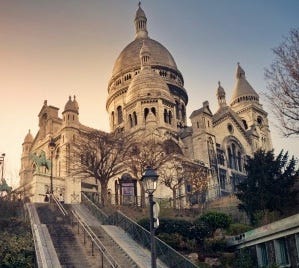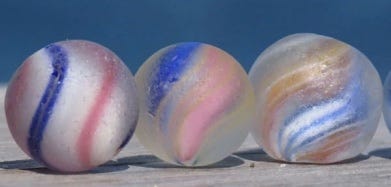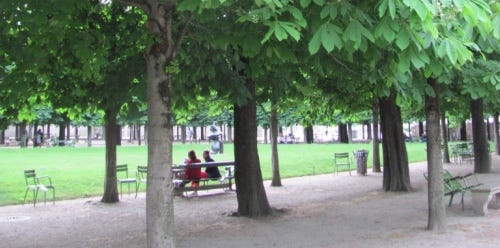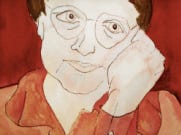The Long Fingers of Paris
Multi-colored lights and intriguing possibilities tumble out into the narrow lanes from small Italian trattorias and intimate Greek bistros.
For I have known them all already, known them all –
Have known the evenings, mornings, afternoons
I have measured out my life in coffee spoons...
TS Eliot
A giggle of long-haired girls is admiring the honeyed delicacies in the window of the Tunisian bakery.
They are wearing the too-tight jeans and the cropped white T-shirts that are every father’s nightmare.
The girls, in turn, are affectionately appraised by the thin, pale boys who come to the Quai Saint-Michel to buy their lab books at Gibert Jeune. Promises of clever conversation and short-term romance permeate the cool evening air.
This is the Left Bank. This is La Huchette, between Place Saint-Michel and Saint-Severin – a sensory circus, delicious, dazzling, fragrant, that comes to life at the setting of the sun. Multi-colored lights and intriguing possibilities tumble out into the narrow lanes from small Italian trattorias and intimate Greek bistros. Handsome dark-eyed men in white aprons stand in doorways, seducing diners into their parlors.
The windows are decorated with geometric arrangements of bright tomatoes and peppers. Lobsters and less familiar crustaceans on mounds of ice hypnotize with their beady black eyes and waving antennae. The balalaikas and accordions play sweet nostalgic melodies from old movies seen long ago, making me hunger for something – I am not sure for what exactly, but I feel certain it can be found here in La Huchette.
I left the metro at Anvers station very early this morning, wound through the still sleeping Marchè Saint-Pierre and climbed the endless stairway to the Basilica of Sacré-Coeur. Sitting on the cold pavement with other early risers, I look over a thirty mile arc of city diffused in a fine blue filter of fog.
To the west, the Eiffel Tower stands, a ready backdrop for another million selfies. To the east, the delicate spire of Sainte-Chappelle and the towers of Notre-Dame emerge from the shadows at perfect counter-point. Just below, the Seine curves through the city like the smile of the Cheshire cat.
Paris from the steps of Sacré-Coeur is a view that defies description for all the feelings it evokes. Her silver-blue rooftops, her wide chestnut-shaded boulevards, her towering, universally recognized monuments – the romance is overwhelming. All travelers here feel an almost tearful nostalgia, an embarrassing sentimentality. Fortunately, we are allowed to have emotional outbursts any time we are moved in Paris, which is often. It is, indeed, expected of us. We have the obligation and the right to make fools of ourselves here, as long as we do not brutalize the language. A small price to pay.
Montmartre is just beginning to yawn and stretch as I descend in search of breakfast. Near La Place du Tertre, street artists have not yet set up their easels or hung their charming cliché paintings above the side walk. Breathing in a fortifying cup of café au lait under a red umbrella, I watch Montmartre perform its morning ablutions around me, scrubbing itself up for another day of tourism. I dig a crumpled paperback out of my canvas bag, a dog-eared, tea-stained collection of TS Eliot, and finish my breakfast over another verse of The Love Song of J. Alfred Prufrock.
Let us go then, you and I
When evening is spread out against the sky
Like a patient etherized on a table;
Let us go through certain half-deserted streets
The muttering retreats
Of restless nights in cheap hotels
And sawdust restaurants with oyster shells...
In the narrow busy streets of the Marais are hidden many antique and curio shops, some cluster together in courtyards like memorabilia pigeon coops, others are cleverly concealed in alleys or in back of other shops where only the persistent can find them. On a mission, I nose into every small corner asking, “Avez-vous des petits boules de verre?” I am seeking antique marbles to add to my collection, but the word for marbles is not in my pocket dictionary. My attempts at French circumlocution seem to be the cause of some merriment and I begin to suspect, by the smirks, that I will probably not find what I seek by asking the shop-keeper if he has “little glass balls”. I change strategy. Rooting round in my bag I pull out a pink and cobalt blue handmade peppermint swirl – a real beauty, to clarify the object of my search. His eyes twinkle. He shakes his head and clucks, “Tsk! Non, madame, Je ne vends pas des billes ici.” Billes! Okay. Got it. The treasure hunt continues until noon.
In the tea shop I don’t even try to decipher the menu. I just point at something on the list that I can afford and wait to see what lunch will be. Discovery learning, it is called. A sort of culinary Russian roulette. Located a short walk from Saint-Paul on the Rue Rosiers, Le Loir Dans la Théière, (The Doormouse in the Teapot) is in the heart of the old Jewish sector. It is a cozy place on this grey drizzly afternoon, albeit somewhat off-kilter. The furnishings are a jumbled collage of worn, mismatched, outsized and over-stuffed armchairs explained only by a mural of the Mad Hatter’s Tea Party. Lunch may be served on a low coffee table or on a table as high as your chin.
A perfectly brewed pot of Ceylon tea immediately appears on my table. Discretely kicking off my shoes, I pour a steamy cup and line up three marbles on my napkin to admire the treasure I have found. All German hand-mades, all from the early 1900s. Madame had retrieved them covered with dust from the bottom of a fishbowl full of toy soldiers. She’d nearly forgotten she had them. Dusting them off with her wrinkled hankie, she’d shrewdly offered them to me for €6 apiece. I politely accepted her price without a blink. She scowled, realizing too late I would have paid much more.
The friendly waitress brings me what looks like a spinach and egg casserole with a pungent cheese and slices of green apple – a good choice. Though I am seldom disappointed with my “check the price and point” method, I have learned to never order something called boudin noir, no matter how hungry or broke I may be. Big mistake.
I share a quiet, late afternoon bench in the Tuileries Garden with a stranger. He offers me raspberries from his basket, speaking what sounds like maybe Polish. He appears to understand no English and is somewhat amused when I pull a packet of broken chocolates out of my bag along with half a bottle of cheap but acceptable Bordeaux and two paper cups. We share these convivial treats, carrying on a mostly incomprehensible, but hilarious, conversation that might have been about bee-keeping, the Bible, taxi-drivers, and little gardens planted next to train-tracks. I am not sure. It is truly amazing though, how many stories can be shared in mutually unintelligible language with the help of hand gestures, a few drawings on a brown paper bag, and a little tongue-loosening red wine.
He says good-bye as the sun falls behind the trees. I stay a while longer to contemplate the innate sociability of our species, the ritual sharing of food, the spontaneity and transience of some friendships.
Across the wide gravel pathway, is a very old woman in a shabby brown coat that hangs limply around her knees. She is picking up chestnuts and stuffing them into a large cloth bag. As she works, she carries on a rather earnest conversation with a squirrel that is clinging upside down to the tree trunk. His head cocked to one side, he chatters furiously at her. I suppose they are arguing over who holds the gleaning rights under this particular tree. I reflect for a moment. Possibly I had better watch carefully how this work is done and mark down the appropriate attire. As my savings run out, I may be making my own living this way sooner than I would wish.
After the sunsets and the dooryards and the sprinkled streets
after the novels, after the teacups,
after the skirts that trail along the floor,
after this and so much more...
It is now maybe one in the morning. From my tiny closet-sized room in the Hotel Esmeralda, I look down upon the 13th century stones of Saint-Julien-le-Pauvre. On the left, the creamy, glowing facade of Notre Dame is reflected on the Seine. A young musician leans against the lamp-post below, banging on a battered guitar with one broken string dangling. But for him, the street is now deserted. He is singing “Blackbird”, an old Beatles tune, to no one but the gargoyles perched on the eaves of Our Lady. It is a very good thing he cannot see their faces.
Reluctant for some reason to let this day end, I pour a little more tea and continue reading. Mr Prufrock, a desperate soul, who, if I interpret it correctly, was filled with frustration for all the great things he had never done, seen or been in his life. He was plagued by remorse remembering all the things he had once mistakenly thought were so all-important. Do any of us need to concede to measuring out our lives in coffee spoons? So much beauty and meaning is all around us in the most insignificant of found objects, the humblest of people, the smallest of victories, the most nondescript of unsung corners.
Opening our eyes to our surroundings at home or abroad, taking our time, we realize that even the smallest incidental moments may in fact give rise to a major awareness in our lives. The rooftops, the red umbrella, the minutes over a good cup of coffee, the curio shop bargain, the Polish conversation, the chestnut collector, the colorful kaleidoscope of La Huchette, the solitary singer – which will have been my teacher today? We never know what brief, serendipitous event will stand out from all the others, and, in retrospect, be the one important experience that started us on some new pathway of appreciation, or a new way of seeing or being.
There is a scratching at my door. It is Hugo, the resident brindled cat who sashays in announcing, “Je couche avec toi ce soir”. I am honored. He curls up now on top of my feet, and we fall asleep together, peaceful, trusting, both “smoothed by the long fingers” of Paris.
If you liked this visit to Paris, then THIS one is sure to make you laugh! Click here The Half-Star €50 A Night Very Basic Single














It's been a very long time but I remember Montmartre and The Louvre with it's surprisingly small painting of the Mona Lisa. Too many things to see with too little time. Such good writing! "Thanks for the memories", Sharron.
This is such a wonderful series of vignettes and so beautifully written. Starting with "a giggle of girls'" and moving on to "Intriguing possibilities tumble out into the narrow lanes," and "The Seine curves...like the smile of a Cheshire cat." Beautiful and descriptive. I felt like I was walking right along with you, discovering instead of being told.
The conversation with the Polish stranger was pure gold. Those types of interactions are so universally human.
Asking the shopkeeper if he has "little glass balls," and the "Culinary Russian roulette," humorous and relatable.
And the wisdom of the reflection, "which will have been my teacher today?"
Well done, Sharron.